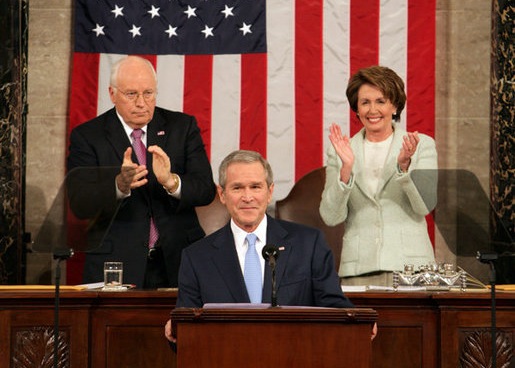Trump’s Address to Congress
Posted on February 27, 2017

State of the Union Address. House Chamber, US Capitol.
(Also published on Political Storm)
Technically, when Donald Trump addresses a Joint Session of Congress later this week, it won’t be a State of the Union.
Presidents don’t give those types of speeches until they have had a whole year under their belts.
Usually, when a new president takes the reigns of power, the State of the Union isn’t so great. But in time, things seem to get better, miraculously, through the bold and effective leadership of whomever is addressing the Congress at the time.
There are certain rituals that have developed over the years when a president addresses Congress.
You have members from House arrive early to get a prized location on the center aisle. Eliot Engel, a Democrat from New York, is usually among the first to get to the Chamber.
The chairs on the dais are rearranged to include a seat for the president of the Senate, which usually means the vice president. He sits next to the Speaker of the House, looking down among the assembled masses.
The Speaker gavels the session into order, the Clerk of the House announces the arrival of the president, and the he walks in, accompanied by the leaders of both parties and both bodies.
Before the president speaks, he is introduced by the Speaker, again, and he usually get a standing ovation, which shows the country that the Congress has respect for the president, no matter how much they might secretly despise him.
Each new presidential address has its own unique twist. In 1997, Bill Clinton had to share time with O.J. Simpson, who would be acquitted of murder charges about three quarters through the president’s speech. Clinton would face his own acquittal in 1999, when he addressed the Congress after the Senate let him stay in office, despite being impeached by the House for lying under oath about having sex with Ms. Lewinsky. George Bush, shortly after the 9/11 attacks, would call out the Axis of evil in 2003, Iran, Iraq and North Korea, none of which played a role in financing the terrorists who did the dirty deed. Barack Obama would be called a liar during his State of the Union address by Congressmen Joe Wilson, for making the claim that his health insurance would not help illegal immigrants.
It’s hard to predict how the Congress will react to Donald J. Trump. No doubt, he has been a polarizing figure on the left, and on the right, he often raises more questions than answers. Undoubtedly, Trump will break new ground as he addresses the Congress for the first time and, undoubtedly, it will cause great anxiety among the politicians in the chamber.
Here are my four thoughts on how he should go about constructing the speech:
1) Be concise: congressional addresses have become long, boring, disorganized, and ineffective. Bill Clinton’s averaged over 7400 words per address, which, if you figure a minute per 100 words, would well over an hour. George W. Bush was briefer, but at 5200 words, was still close to an hour. Barack Obama was somewhere in between the two, at around 6800, which was still too long. In this world where the average attention span is around 140 characters, anything more than 30 minutes is too long.
2) Be clear: set out your three themes and pound on those themes. Ronald Reagan had two things he wanted to be remembered for: beating the Soviet Union and reviving the economy. George W. Bush was all about the war on terror and education reform. For Trump, his three themes are replacing Obamacare, jump-starting the economy by reforming the tax code, and enforcing our immigration laws. Keep to those three and the speech will be a success.
3) Be bold: don’t make any little plans. Congressional addresses are not about the small details. They are about the bold strokes. Set up big goals and then detail how you plan to achieve them. And don’t be afraid to enlist the support of the American people to prod Congress into action. Inertia is a powerful force and compelling the politicians into action is not easy to achieve.
4) Be nice: President Trump has a notorious thin skin. When attacked, he counterattacks. But when it comes to this speech, he should disarm the haters with charm. He should say nice things about his pal, Chuck Schumer. He should pay tribute to John Lewis and his sacrifices in the pursuit of civil rights. He should admire the passion of Nancy Pelosi. And he should say nice things about President Obama and Hillary Clinton. He doesn’t have to believe a word of it. But, for any new president, playing nice will pay long dividends with the American people and with the folks in the room.
